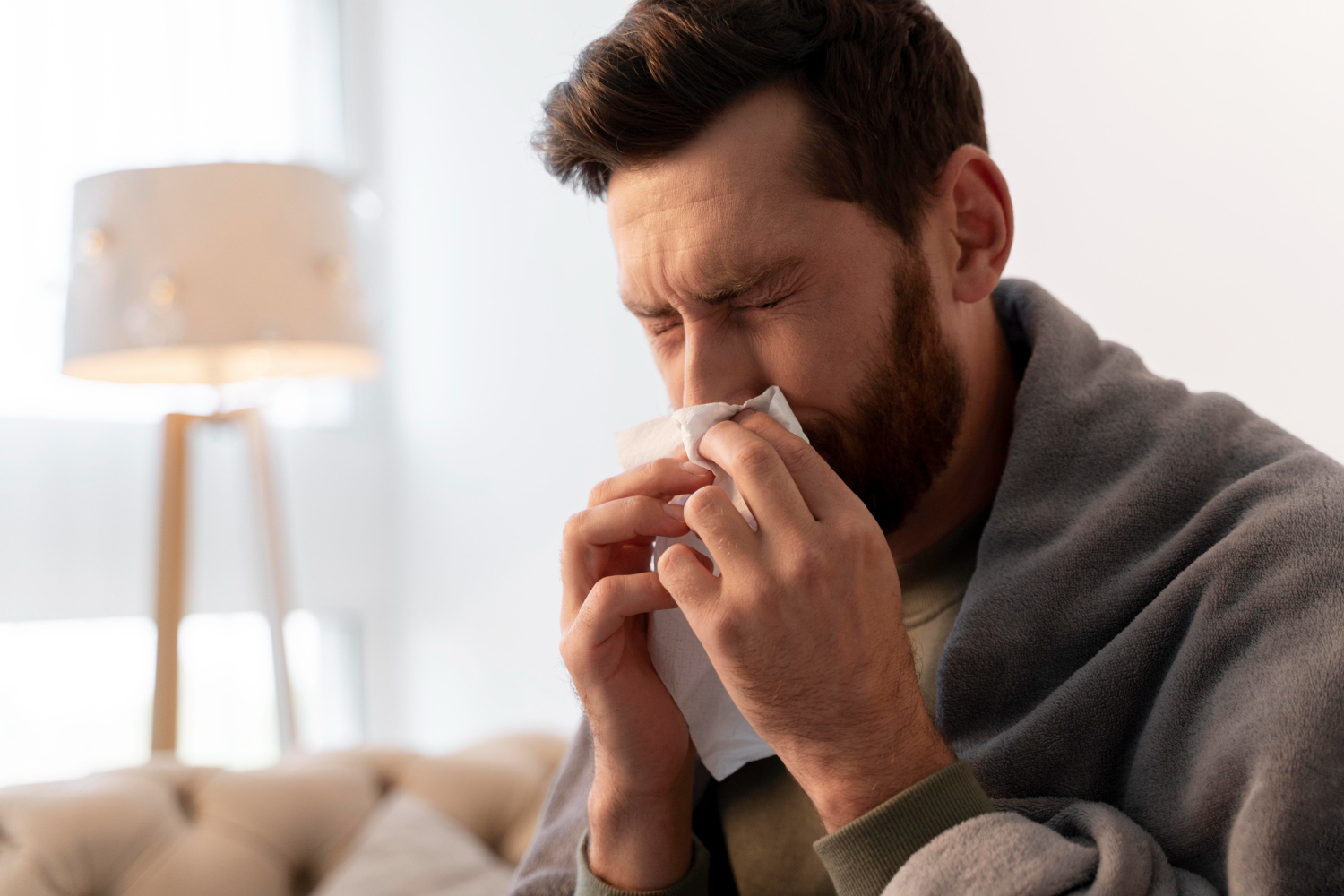A common cold is a viral infection that affects your nose and throat. It can cause symptoms like sneezing, stuffy or runny nose, sore throat, cough, and mild fever. There is no cure for a common cold, but you can take some steps to ease your discomfort and recover faster. In this article, we will share some tips on how to practice common cold self-care at home.
Common Cold Self-Care: Drink Plenty of Fluids
Drinking fluids can help you:
- Stay hydrated
- Thin the mucus in your nose and throat
- Prevent dehydration
- Soothe a sore throat
- Reduce a fever
You should drink at least eight glasses of clear liquids per day, such as:
- Water
- Tea
- Juice
- Broth
Avoid alcohol and caffeine, which can:
- Dehydrate you
- Worsen your symptoms
- Interfere with your sleep
Common Cold Self-Care: Get Enough Rest
Resting can help you:
- Boost your immune system
- Heal faster
- Cope with fatigue and malaise
You should get at least seven to eight hours of sleep per night, and take naps during the day if you feel tired. Avoid strenuous activities and stress, which can:
- Weaken your immune system
- Prolong your illness
Common Cold Self-Care: Use Nasal Sprays or Drops
Nasal sprays or drops can help you:
- Relieve nasal congestion
- Shrink the blood vessels in your nose
- Reduce the swelling and inflammation
You can use over-the-counter decongestant sprays or drops, or saline (salt water) sprays or drops, which are:
- Gentler
- Safer
Follow the directions on the label, and do not use them for more than five days, as they can:
- Cause rebound congestion
- Worsen your symptoms
Common Cold Self-Care: Gargle with Salt Water
Gargling with salt water can help you:
- Reduce the inflammation and pain in your throat
- Flush out the bacteria and viruses that may cause the infection
To make a saltwater solution, you need to:
- Dissolve half a teaspoon of salt in a glass of warm water
- Gargle for a few seconds
- Repeat several times a day
Common Cold Self-Care: Take Over-the-Counter Medications
Over-the-counter medications can help you:
- Reduce the discomfort
- Lower the fever
- Relieve the headache or body aches
- Control the sneezing or runny nose
These include pain relievers, such as:
- Acetaminophen (Tylenol)
- Ibuprofen (Advil, Motrin)
And antihistamines, such as:
- Cetirizine (Zyrtec)
- Loratadine (Claritin)
However, you need to:
- Be careful not to take more than the recommended dose
- Avoid taking two medications with the same active ingredient
- Do not give aspirin to children or teenagers, as it can cause a rare but serious condition called Reye’s syndrome
Common Cold Self-Care: Eat Healthy Foods
Eating healthy foods can help you:
- Recover faster
- Boost your immune system
- Protect your cells from oxidative stress and inflammation
Some of the best foods to eat when you have a cold are:
| Food | Benefits |
|---|---|
| Chicken soup | Provides fluids, electrolytes, and protein; reduces inflammation and mucus production |
| Vitamin C-rich foods | Helps your immune system fight off the virus and prevent complications; examples are oranges, strawberries, kiwis, and bell peppers |
| Antioxidant-rich foods | Protects your cells from oxidative stress and inflammation caused by the virus; examples are kale, broccoli, blueberries, and dark chocolate |
Some of the foods to avoid when you have a cold are:
| Food | Drawbacks |
|---|---|
| Alcohol and caffeine | Dehydrates you and interferes with your sleep quality and immune function |
| Dairy products | Increases the production of mucus and makes you feel more congested; examples are milk, cheese, and yogurt |
| Spicy foods | Irritates your throat and stomach and causes heartburn and indigestion; examples are chili, curry, and garlic |
Common Cold Self-Care: Try Natural Remedies
Natural remedies may help you:
- Cope with the symptoms of a cold
- Enhance your immune system
- Prevent or treat the infection
These include:
- Honey, which can soothe a sore throat, suppress a cough, and act as an antibacterial and antiviral agent; you can add a teaspoon of honey to a cup of warm water or tea, or take it by itself; do not give honey to children under one year of age, as it can cause botulism, a rare but serious illness
- Ginger, which can reduce inflammation, nausea, and pain, and stimulate blood circulation and mucus clearance; you can add a slice of fresh ginger to a cup of hot water or tea, or chew on a piece of candied ginger
- Echinacea, which is a herb that can stimulate your immune system and help you fight off the virus; you can take echinacea as a tea, capsule, or tincture, but consult your doctor before using it, as it may interact with some medications or cause allergic reactions
Common Cold Self-Care: Stay Updated on the Latest News and Trends
The common cold is a constantly evolving virus that can change its characteristics and behavior over time. Therefore, it is important to stay updated on the latest news and trends regarding the common cold, as well as other respiratory viruses, such as flu, RSV, and COVID-19. Some of the recent news and trends on the common cold are:
- A new study found that the common cold virus can cause life-threatening blood clot disorders, such as thrombocytopenia, which is a low platelet count in the blood
- A new study found that some immune cells in our body can remember the common cold coronaviruses from childhood, and use this memory to fight off the COVID-19 virus
- A new study found that a chemical compound found in green leafy vegetables, such as broccoli and kale, can inhibit the replication of the common cold virus, as well as the COVID-19 virus and other coronaviruses
Conclusion
The common cold is a common and usually mild illness that can be treated at home with some simple and effective self-care steps. However, if your symptoms get worse or do not improve within 10 to 14 days, you should see your doctor, as you may have a bacterial infection or a complication, such as sinusitis, ear infection, or pneumonia. You should also seek medical attention if you have trouble breathing, chest pain, high fever, severe headache, or any other signs of a serious condition. Remember to take care of yourself and your loved ones, and stay healthy and safe.





